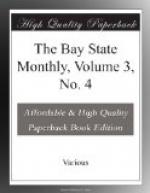Having defended Fort Sumter for thirty-four hours, until the quarters were entirely burned, the main gates destroyed by fire, the gorge walls seriously injured, the magazine surrounded by flames, and its door closed from the effect of heat, four barrels and three cartridges of powder only being available, and no provisions remaining but pork, I accepted terms of evacuation offered by General Beauregard, being the same offered by him on the 11th inst., prior to the commencement of hostilities, and marched out of the fort Sunday afternoon, the 14th inst., with colors flying and drums beating, bringing away company and private property, and saluting my flag with fifty guns.
ROBERT ANDERSON,
Major First Artillery, Commanding.
HON. S. CAMERON, Secretary of War, Washington.
WAR DEPARTMENT, WASHINGTON, April 20, 1861.
MAJOR ROBERT ANDERSON, Late Commander at Fort Sumter:—
MY DEAR SIR,—I am directed by the President of the United States to communicate to you, and through you to the officers and men of your command at Forts Moultrie and Sumter, the approbation of the government of your and their judicious and gallant conduct there, and to tender you and them the thanks of the government for the same.
SIMON CAMERON,
Secretary of War.
The conspiracy had now ceased to be such. Revolution and war had begun, and by the firing upon Fort Sumter the political atmosphere was cleared up as if by magic. If there were now any doubters on either side they had betaken themselves out of sight; for them, and for all the world, the roar of Beauregard’s guns had changed incredulity into fact. Behind those guns stood seven seceded States, with the machinery of a perfectly organized local government and with a zeal worthy of a nobler cause.
The news of the assault reached the Capitol on Saturday, April 13th, On Sunday, the 14th, the President and his cabinet held their first council of war. On the following morning the first “call for troops” was proclaimed to the whole country, in a grand “appeal to all loyal citizens to favor, facilitate, and aid this effort to maintain the honor, the integrity, and existence of our National Union, and the perpetuity of popular government.”
The North was now aroused. Within forty-eight hours from the publication of the proclamation armed companies of volunteers were moving towards the expected scene of conflict. For the first time in the history of this nation parties vanished from politics, and “universal opinion recognized but two rallying points,—the camps of the South which gathered to assail the Union, and the armies of the North that rose to defend it.”




